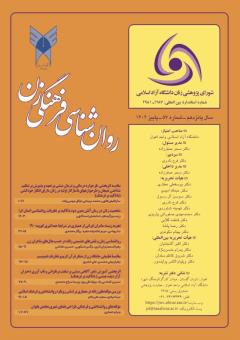مقایسۀ تطبیقی جایگاه زن از منظر قرآن کریم و نظریات فمینیسم
محورهای موضوعی : دین، مذهب و فقه
زهرا ربیعی محسن
1
*
![]() ,
علی خضری
2
,
علی خضری
2
![]()
1 - کارشناسی ارشد، گروه ز بان و ادبیات عربی، دانشکده ادبیات و علوم انسانی، دانشگاه خلیج فارس، بوشهر، ایران.
2 - دانشیار، گروه زبان و ادبیات عربی، دانشکده ادبیات و علوم انسانی، دانشگاه خلیج فارس، بوشهر، ایران.
کلید واژه: فمینیسم, شخصیت, قرآن,
چکیده مقاله :
هدف پژوهش حاضر، بررسی شخصیت زن از دیدگاه قرآن در مقایسه با نظریات فمینیسم می باشد. جامعه پژوهش شامل دیدگاه قرآن و نظریات فمینیسم بود. نمونه پژوهش نص قرآن ومتون فمینیسمی مرتبط با شخصیت زن بود. روش این پژوهش توصیفی ـ تحلیلی است. گردآوری داده ها با استفاده از روش کتابخانه ای انجام گرفت. سپس یافته ها مورد تحلیل قرار گرفت. نتایج نشان داد که شخصیت یکی از موضوعات اصلی در حوزه روان شناسی است؛ و بسیاری از روان شناسان مانند یونگ، فرانکل و آلپورت داشتن یک نظام ارزشی دینی را بخش مهمی از سلامت روان در نظر میگیرند، روان شناسان غالبا نقش ارزش را از منظر هویت یابی و شکل گری شخصیت افراد مورد توجه قرار داده اند. شخصیت زن در قرآن کریم تصویرجامعی است که دین اسلام در توصیف ها، ارزش ها و حقوق، از شخصیت زن مسلمان ارائه داده است؛ مقام زن در قرآن چنان است که یک سوره ی قرآن نساء نامیده شده و در سوره های دیگر از قرآن مسائل مربوط به حقوق و منزلت زنان آمده است. در فرهنگ اسلام، به تصریح قرآنکریم، مقام وجایگاه برای زن و مرد یک سان است.فمینیستها مدعی برابری کامل و یک نواخت و به دور از هرگونه تفاوت در حقوق همه ی انسان ها، اعم از زن و مرد هستند.اسلام هیچ یک از شاخه ها و دیدگاه های فمینیست را تأیید نمی کند.امروزه زنان بسیاری دریافته اند که ره آورد فمینیسم ایجاد یک باور غلط در زنان بوده است که همواره از هر تفاوتی تبعیض را بفهمند.در متون دینی آموزه برابری، جایگاهی ندارد و ادبیات دینی در دفاع از زنان، ادبیاتی متناسب محور است.
The current research was intended to examine the woman character from the Qur’an point of view compared to the feminism theories. The statistical universe of the research included the Qur’an point of view and the feminism theories. The sample enfolded the text of the Quran and the feminism texts considering the woman character. The conducted method of the research was descriptive analytical. The data was collected via library method. Finally, the data was analyzed. The results indicated that character is one of the main topics in the field of psychology; and many psychologists such as Jung, Frankel and Allport consider having a religious value system as an important part of mental health. Psychologists have often paid attention to the role of value from the perspective of identifying and formation of the individuals’ character. The character of a woman in the Holy Qur'an is a comprehensive image that the religion of Islam had presented in its descriptions, values and rights of the character of a Muslim woman. The status of women in the Qur'an is such that a chapter(surah) of the Qur'an is called "Nisaa" (women). And in other chapters of the Qur'an, there are issues related to the rights and dignity of women. In Islamic culture, according to the Qur'an, the status and position of men and women is the same. Feminists claimed complete and uniform equality and far from any difference in the rights of all human beings, both men and women. Islam does not approve any of the feminist branches and views. Today, many women have realized that the goal of feminism was to create a false belief in women to always understand discrimination from any difference. In religious texts, the doctrine of equality has no place, and religious literature in defense of women is proportional literature.
The Holy Quran.
A collective compilation of student sisters. (2000). Women from the perspective of religions and schools. Qom: Nasayeh Publications. [Persian] URL: http://www.lib.ir/book/78942222
Abuisani, H., & Kar, F. (2012). Analysis of “Zainab's” novel based on feminist criticism. Research Journal of Arabic Literature Criticism, 4(63), 28-8. [Persian] URL: https://jalc.sbu.ac.ir/article_98207_aa083031a9ea3afae2083aa750215e3f.pdf
Agha Babaei, E. (2012). Alireza Shalbaf. Feminism and Feminist Knowledge. second edition. Qom: Office of Women's Studies and Research. [Persian] URL: https://fidibo.com/book/114402
Chiraghi Kotian, I. (2010). Family, Islam and Feminism, first edition. Qom: Publications of Imam Khomeini Educational and Research Institute. [Persian] URL: https://eshop.iki.ac.ir/shop/7/Product/3129
Durant, W. (1995). The Pleasures of Philosophy. Ch. 21. Tehran: Scientific and Cultural Publications. [Persian] URL: https://www.iranketab.ir/book/2063-the-pleasures-of-philosophy
Farahmand, M. (2004). Feminism and lisbinism. Women's Book, 7(28), 4. [Persian] URL: https://www.magiran.com/paper/290983/
Friedman, J. (2002). Feminism. vol1. Tehran: Ashian. [Persian] URL: https://www.gisoom.com/book/1783296
Garrett, Stefani. (2010). Sociology of Gender. Translated by Katayoun Beqaei. (2019). Tehran: Nasser Dizher. [Persian] URL: https://www.gisoom.com/book/11316541
Javadi Amoli, A. (2008). Woman in the mirror of Jalal and Jamal. Qom: Asra Publishing Center. [Persian] URL: https://bookroom.ir/book/655/
Khomeini, R. (RA) Editing and Publishing Institute in collaboration with the Cultural Studies and Research Center of the Ministry of Culture and Islamic Guidance .(1995). The Place of Women in Imam Khomeini (RA) Thought. Vol 4, Tehran: Imam Khomeini (RA) Publishing Institute . [Persian] URL: https://bookroom.ir/book/492/
Khomeini, R. (1963). Sahifa Noor. Vol. 18, 12, 6, 5. Tehran: Imam Khomeini Publishing House. [Persian] URL: https://lib.eshia.ir/50080/1/3
Majlesi, M. B. (1981). Bihar al-Anwar, "Al-Jama'ah Ladur al-A'imah al-Athar". vol. 103, 10. Beirut Lebanon: Dar Ihya al-Tarath. [Persian] URL: https://noorlib.ir/book/info/1407/
Mishkini, Ali. (1980). Marriage in Islam. Tehran: Yasir Publications. [Persian] URL: https://lib.ui.ac.ir/inventory/1/33662.htm
Motahari, M. (1979). Collection of works. vol. 19. Tehran: Sadra Publications. [Persian] URL: https://www.gisoom.com/book/1373006/
Rizvani, A. A. (2006). Islamology and answers to doubts. second edition. Qom: Jamkaran Mosque Publisher. [Persian] URL: https://www.ghbook.ir/index.php?option=com_dbook&task=viewbook&book_id=932&lang=fa
Sharif al-Razi, M. H. (1009). Nahj al-Balagha. Translated by Mohsen Dashti. (2014). Tehran: Amirul Mominin. [Persian] URL: https://www.gisoom.com/book/1885411//
Zebainejad, M. R., & Sobhani, M. T. (2000). An introduction to the female personality system in Islam, first edition. Qom: Office of Studies and Research. [Persian] URL: https://www.ghbook.ir/index.php?option=com_dbook&task
_||_
